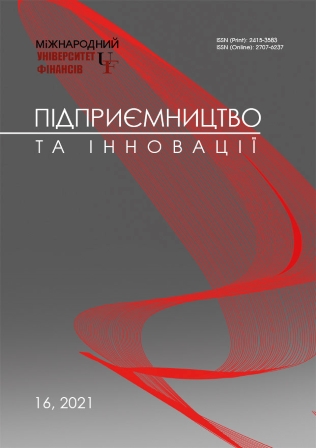INSTITUTIONAL FUNDAMENTALS OF ECONOMIC DEVELOPMENT REGIONS OF UKRAINE IN THE LIGHT OF FORMATION INNOVATIVE SYSTEMS
Abstract
This article highlights the use of relevant institutional principles of economic development of domestic regions in the light of the formation of innovation systems. Thus with use of system approaches, methods of the analysis and synthesis, induction and deduction, the comparative analysis it is established that its level is influenced first of all by the historically formed institutional basis of economic system of the state. At the same time, based on the institutional principles of economic development of the region, we can talk about creating different types of innovation systems. At the same time, in a broad interpretation, the concept of innovation systems combines all the elements and aspects of the economic structure and institutional structure, which has a significant impact on the processes of learning, search and use of innovations in the economy of the territory. The formation of regional innovation policy in Ukraine is largely a process that depends on external conditions (including the availability of resources from European funds). To a lesser extent, it is the result of grassroots needs and the reorientation of regional policy to the challenges of economic innovation. At the same time, the regional innovation system is not a simple analogue of the concept of the national innovation system and vice versa, although their common feature is a multidimensional and interactive interpretation of the phenomenon of innovation, in particular, complementary and interdependent interpretations of their creation, absorption and diffusion. And the emphasis here is on other elements of their creation and development. At the same time, the challenge for regional investment policy should be the dissemination and wider use of the regional forecast. Therefore, regional foresight should become a general and key tool to stimulate relevant economic change, along with expanding the monitoring of innovation processes and opening and disseminating access to this information to a wide range of businesses, which should become the foundation for building regional innovation systems. The resulting knowledge of the mechanisms that operate in the regional environment is necessary not only to understand such processes, but should be a factor in regional investment policy.
References
Veblen, Thorste Bund. The Theory of the Leusure Class. Public domain the USA. 1997. 792 p.
Pietrzyk I. Polityka regionalna Uniji Europejskiej i regiony w państwach członkowskich. Warszawa: Wydawnictwo Naukowe PWN.
OECD. Innovation Strategy, Getting a Head Start of Tomorrow, OECD Publishing. Ottaviano, G., Thisse, J. F., 1998. Agglomeration and Trade Revisited, Discussion paper series. London: Centre for Economic Policy Research, CEPR, 2010.
Chądzyński, J., Nowakowska A., Przygodzki Z. Region i jego rozwoj w warunkach globalizacji. Warszawa: CedeWu.pl Wydawnictwa Fachowe, 2007. 119 р.
Lundvall B.A. National systems of innovation: towards a theory of innovation and interactive learning. London Printer, 1992. 12 р.
Asheim B. Differentiated knowledge bases and varieties of regional innovation systems. «Innovation. The European Journal of Social Sciences», September 2007. Vol. 20, Iss. 3.
Braczyk H.J., Cooke Ph., Heidenreich M. Regional innovation systems. The role of governances in a globalized world. London: Un-ty College, 1998. P. 11.
Закон України від 08.09.2011 № 3715-VI «Про пріоритетні напрямки інноваційної діяльності в Україні» (зі змін. та доп.). URL: https://zakon2.rada.gov.ua (дата звернення: 27.01.2021).
Moulaert, F., Hamdouch, A. (2006). New views of innovation systems. Agents, rationes, networks and spatial scales in the knowledge infrastructure. The European Journal of Social Sciences. 2006. Vol. 19. Iss. 1. P. 34–67.
Veblen, Thorste Bund (1997). The Theory of the Leusure Class. Public domain the USA. 1997. 792 p.
Pietrzyk, I. (2000). Polityka regionalna Uniji Europejskiej i regiony w państwach członkowskich. Warszawa: Wydawnictwo Naukowe PWN, 2000.
OECD (2010). Innovation Strategy, Getting a Head Start of Tomorrow, OECD Publishing. Ottaviano, G., Thisse, J. F., 1998. Agglomeration and Trade Revisited, Discussion paper series. London: Centre for Economic Policy Research, CEPR, 2010.
Chądzyński, J., Nowakowska A., Przygodzki Z. (2007). Region i jego rozwoj w warunkach globalizacji. Warszawa: CedeWu.pl Wydawnictwa Fachowe, 2007. S. 119.
Lundvall, B. A. (1992). National systems of innovation: towards a theory of innovation and interactive learning. London Printer, 1992. S. 12.
Asheim, B. (2007). Differentiated knowledge bases and varieties of regional innovation systems. «Innovation. The European Journal of Social Sciences», September 2007. Vol. 20, Iss. 3, 2007. 230 p.
Braczyk, H. J., Cooke, Ph., Heidenreich, M. (1998). Regional innovation systems. The role of governances in a globalized world. London: Un-ty College, 1998. P. 11.
Law of Ukraine of September 8, 2011 № 3715-VI «On Priority Areas of Innovation Activity in Ukraine» (as amend. and sup.). URL: https://zakon2.rada.gov.ua (accessed 27 January 2021).
Moulaert, F., Hamdouch, A. (2006). New views of innovation systems. Agents, rationes, networks and spatial scales in the knowledge infrastructure. The European Journal of Social Sciences. Vol. 19, Iss. 1, Mars 2006. P. 34-67.



